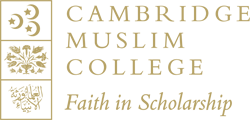PROGRAMME OUTCOMES
The learning outcomes for students completing the programme are as follows:
- Articulate classical Islamic philosophical, theological, medicinal, and psycho-somatic paradigms of human psychology.
- Identify major psychological theories from the 19th century and the development of modern psychology from both secular and spiritual perspectives.
- Engage critically with modern psychology from an Islamic perspective and developments in Islamic psychology in the 20th century.
- Analyse Islamic and secular models of the self and identify what is distinct about Islamic perspectives of lifespan development, personality and therapeutic approaches.
- Differentiate traditional Islamic legal, ethical and historical instantiations and realities of cultural and communal psychologies in contemporary contexts.
- Evaluate innovative approaches to integrating contemporary psychology and classical Islamic psychology in modern contexts.
- Discern the dynamics of counselling skills within a spiritual orientation informed by the Prophetic model and Islamic ethics.
- Formulate the development of self-examination practices informed by the Islamic contemplative tradition oriented toward one’s own self-transformation.
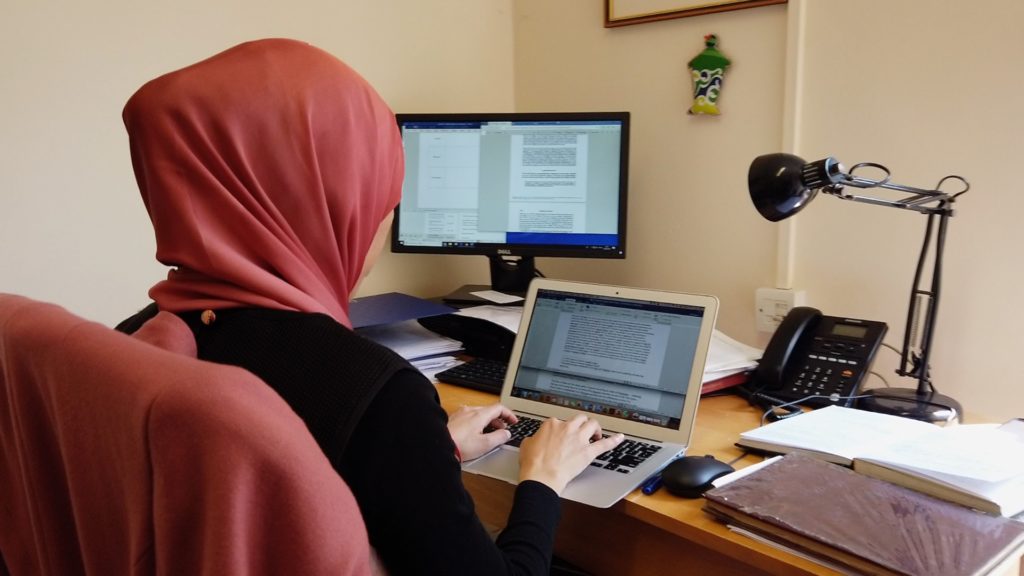
TEACHING METHODS
The programme is designed to be a transformational learning journey for students. Instructors use a learner focused orientation to teaching and provide opportunities for inquiry-based and experiential learning using synchronous online teaching, seminars, and case study sessions.
Students will also observe and monitor their own intellectual, psychological, relational, and spiritual development throughout the programme using a variety of individual and group activities.
This intentional design is meant to develop a rich and engaging cohort of students who interact as a group of learners and seekers, reflecting to one another the principles, practices and skills that they learn throughout the course of study. Thus, the cohort class size will be restricted to 25 students.
PROGRAMME STRUCTURE
- The programme will be delivered over three terms, each 11 weeks in length.
- Six hours contact time in class per week.
- Students should expect to spend nine additional study hours per week.
- Live online lectures take place Mondays, Tuesdays, & Thursdays from 1-3pm UK time.
Students will be assessed using different methods aligned with module objectives. This may include, but not limited to class discussions, essays, critical dialogue, presentations, group projects, journaling progress or written examinations. Students are not permitted to miss more than three live sessions per module. In lieu of missed classes, students must watch recordings of the missed lecture.
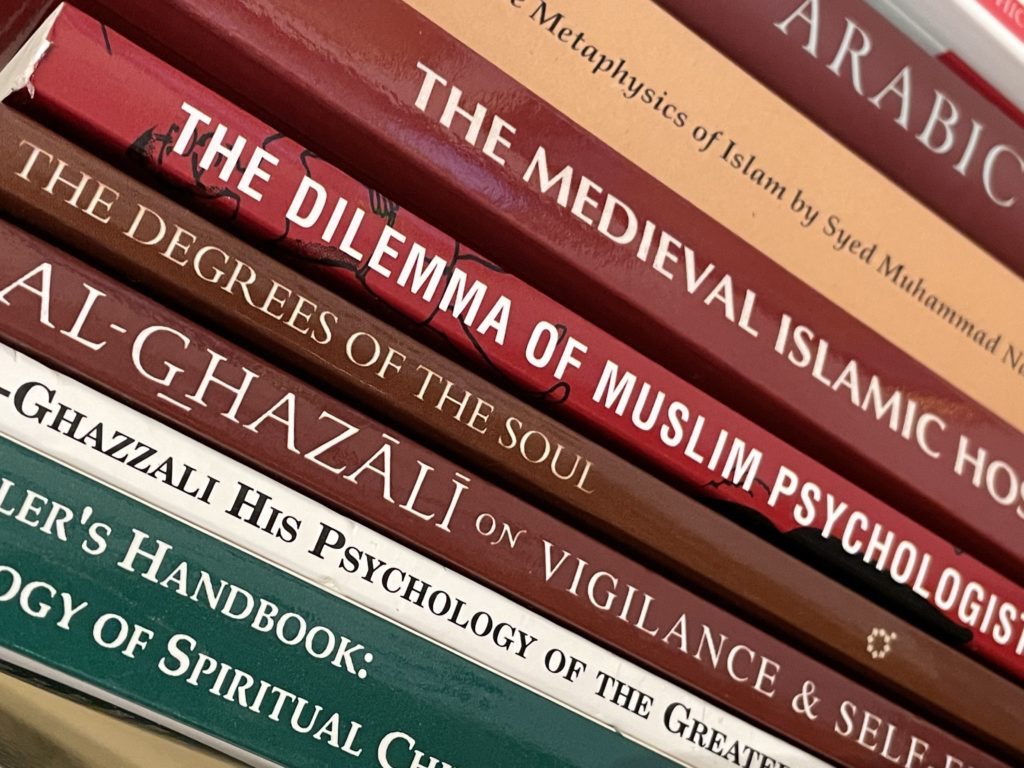
TERM 1: FOUNDATIONS
This module provides a foundational knowledge of classical Islamic understandings of the psyche/soul found in the earliest sources gradually leading into the philosophical and theological traditions. It follows closely the development of Islamic theological and philosophical ideas and questions rooted in the Quran and Islamic thought in dialogue with other philosophical systems.
This module introduces students to the different classical Islamic disciplines that contributed to forming and developing an Islamic understanding of the psyche/soul. These disciplines include: Islamic ethics (akhlāq), law (fiqh), and Sufism (taṣawwuf), as well as their Qur’anic and Prophetic conceptual framework. This module also develops students’ knowledge and understanding of the interconnectivity of these disciplines and an appreciation of the theological, philosophical, and social dimensions of the Islamic paradigm of psychology.
This module presents classical Islamic understandings of the psyche/soul found in the psycho-somatic and medical traditions, starting with Greek (Galenic) medicine, moving on to Prophetic medicine and the holistic Tibb tradition. Students will explore traditional vitalism, the Hikma paradigm, as well as an introduction to natural therapeutics. It will also cover medical institutions and asylums.
TERM 2: TRANSFORMATIONS
This module introduces the fundamental shifts and changes that gave birth to modernity, documenting the birth of modern subjectivity and its associated possibilities and constraints. Starting with the 17th century and ending in the late 20th century, we will look at key figures and currents that brought an end to the traditional worldview and gave birth to the modern worldview and modern psychology.
This module gives students an understanding of various schools of Western psychology from the late 19th century to the early 21st century. The module showcases the various ways in which Islamic psychology can benefit from them. It focuses on how Western psychology conceives of and articulates understandings of religion and spirituality.
This module examines attempts by Muslim thinkers to engage with Western psychology in the 20th century. Students will explore how these attempts offer models of an Islamic psychology, either by presenting new paradigms or critiques of western approaches to psychology. It will be both chronological and geographical exploring experiments in various Muslim countries.
TERM 3: INTEGRATIONS
This module introduces students to a comparative study of Lifespan Development from a contemporary and Islamic perspective. It looks at the entire trajectory of the human soul, from before conception to death and the afterlife. The concept of Fitrah is examined in light of developmental psychology and the role of life circumstances, trauma and personality in shaping one’s psychology over the lifespan.
This module offers students a social psychology understanding of the lived experiences of Muslims in modern secular societies in general, and Muslim-minority contexts in particular. The module looks at how specific cultural, social, political, educational, economic, and legal contexts shape Muslim psychological experiences and behaviour.
This module provides students with an understanding of issues and approaches of contemporary Islamic psychotherapy and counselling. Mental health assessment, diagnosis and treatment are defined from an indigenous Islamic view of health and healing as well as the role of the Islamic psychotherapist within both religious and clinical contexts.
MEET THE FACULTY*
*Subject to change
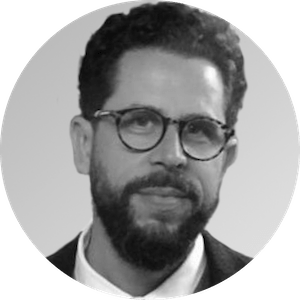
LECTURER & IPD PROGRAMME LEAD
Dr Abdallah Rothman is the Programme Lead of our Islamic Psychology Diploma and holds an MA in Psychology from Antioch University and a PhD in Psychology from Kingston University London. His clinical practice as well as his academic research focus on approaching counselling and psychotherapy from within an Islamic paradigm and establishing an indigenous Islamic theoretical orientation to human psychology that is grounded in the knowledge of the soul from the Islamic tradition. In addition to his academic training he has studied privately with a number of traditional Islamic scholars throughout the Muslim world. Dr Abdallah is visiting professor of psychology at Zaim University Istanbul, International Islamic University Islamabad, and Al-Neelain University Khartoum and co-founder, along with Professor Malik Badri, of the International Association of Islamic Psychology.
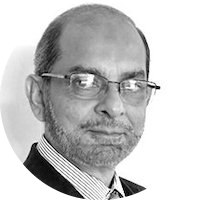
Dr Amber Haque earned his doctorate in psychology from Western Michigan University, and master’s in clinical psychology from Eastern Michigan University. His expertise is in the broad area of mental health and Islamic psychology, especially in early Muslim scholars’ contributions to psychology and psychotherapy. He was previously a Professor of Clinical Psychology at the UAE University in Al Ain, UAE, and earlier an Associate Professor and Head of the Department of Psychology at the International Islamic University Malaysia. He also taught at the National University of Malaysia and the International University of Sarajevo in Bosnia. He has taught more than thirty courses over the last 25 years of his academic career. Dr. Amber received several research awards from various Middle East institutions and published approximately one hundred papers during his academic career and has edited eight books.
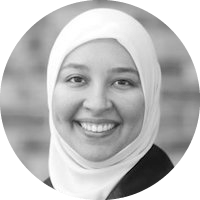
Dr Rania Awaad, M.D., is a practicing Psychiatrist based at the Stanford University School of Medicine. She is a Clinical Associate Professor in the Stanford Department of Psychiatry and Behavioral Sciences where she pursues her clinical practice. She is also a researcher and the Director of the Stanford Muslims and Mental Health Lab where she mentors and oversees multiple lines of research focused on Muslim mental health. She is currently the Psychiatric Director of the El Camino Women’s Medical Group where she pursues her interest in women’s mental health and she serves as the Director of The Rahmah Foundation, a non-profit organization dedicated to educating Muslim women and girls. Additionally, Dr. Awaad serves as the Clinical Director of the Bay Area branch of the Khalil Center. Prior to studying medicine, Dr. Awaad pursued classical Islamic Studies in Damascus, Syria and holds certification (Ijaza) in Qur’an, Islamic Law and other branches of the Islamic Sciences.
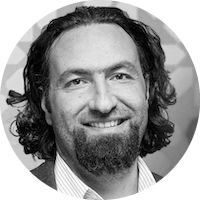
Dr. Samir Mahmoud is currently Academic Director of Usul Academy. Recently he was Assistant Professor at the Lebanese American University. He has a BA (Hons) in Anthropology & Politics with a focus on multicultural theory and comparative religion, and an MA in Architectural History, Theory & Urban Design with a focus on the traditional townscape from the University of New South Wales, Sydney Australia. He also holds an MPhil in Theology & Religious Studies with a focus on comparative philosophy and aesthetics. He completed a PhD in Islamic Studies from the University of Cambridge.
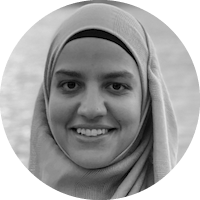
Dr Mariam Sheibani is Assistant Professor in History at the Department of Historical and Cultural Studies at The University of Toronto Scarborough. She received her PhD in Islamic Thought from the Department of Near Eastern Languages and Civilizations at the University of Chicago and holds an MA in Legal Studies, as well as a second MA in Islamic Thought. She previously was a Research Fellow at Harvard Law School and Lecturer at Harvard Divinity School. Her research interests are in late antique and medieval Islamic intellectual and social history, with a focus on the theory and practice of Islamic law and Islamic ethical traditions. Her first book project, Islamic Legal Philosophy: Ibn ʿAbd al-Salām and the Ethical Turn in Medieval Islamic Law, examines how Muslim jurists from the eleventh to fourteenth centuries CE addressed salient questions concerning the purpose of the law and its ethical responsiveness to social needs. She has conducted research in Turkey, Jordan, Egypt, Morocco, Spain, the UK, and West Africa.
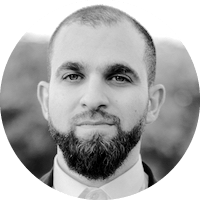
Dr Mazen Atassi is a doctor of Naturopathic Medicine and the founder of Forward To Health, a holistic medicine clinic and educational initiative. Dr Mazen graduated from Indiana University with a Bachelor’s degree in Biology and from the National University of Health Sciences with a Doctorate in Naturopathic Medicine. He practices traditional naturopathy and homoeopathy, with a focus on somatic (body-mind) trauma therapy. He has studied with Hakim Archuletta for several years and taken transmission from him. Mazen has also spent time in Jordan studying Arabic at Qasid Institute.
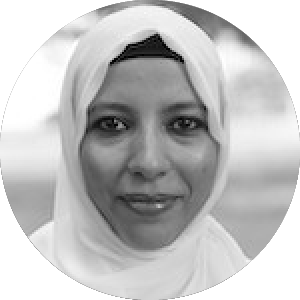
Dr. Najah Nadi is a traditionally trained academic with over two decades of learning experiences and over a decade of teaching experience. Her research focuses on Islamic classical theories of knowledge across disciplines of philosophy, theology, law, and spirituality, as well as fatwas and fatwa institutions. Dr. Najah holds a D.Phil. from the University of Oxford, focusing on the scholarship of the immanent Persian polymath Saʿd al-Dīn al-Taftāzānī (d. 792/1390). She also holds an M.A. in Religious and Theological Studies from Boston University, as well as a B.A. in Islamic Studies from al-Azhar University in Cairo. Dr. Najah has completed several years of traditional training at al-Azhar Mosque, receiving teaching licenses (ijāzāt) in various Islamic sciences. Dr. Najah has served as a junior fellow at the Holberg seminar on Islamic history at Princeton University from 2015-2019, a fellow of peace and reconciliation at Virginia Theological Seminary from 2017-2021. Her teaching courses include Islamic legal theories, classical logic and ontology and Islamic spirituality and ethics.
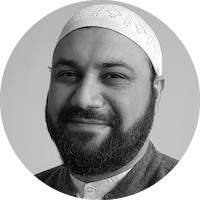
Dr Yusuf Jha currently works as a translator and trainee Mufti at the General Authority of Islamic Affairs and Endowments (AWQAF), Abu Dhabi. He provides Islamic spiritual guidance to the English speaking community across the UAE in a pastoral role. Dr Yusuf has undergone training in trauma-informed counselling modalities such as Neuro Affective Relational Model (NARM). Prior to this he was qualified as an AAOIFI-certified Sharia Auditor and Advisor. He has published numerous papers on the topics of Islamic Psychology, Islamic Finance, Sacred Economics and Ecology, the Islamic conception of Selfhood and is the author of the book, ‘The Way of Return: Responding to Economic and Environmental Injustice Through the Wisdom Teachings of Islam’. Dr Yusuf holds a PhD from the University of Nottingham. His doctoral research explored intersections between Transpersonal Psychology and the concept of spiritual wayfaring (Suluk) as articulated within a classical text of Islamic spirituality.
Is the Islamic Psychology Diploma right for you?
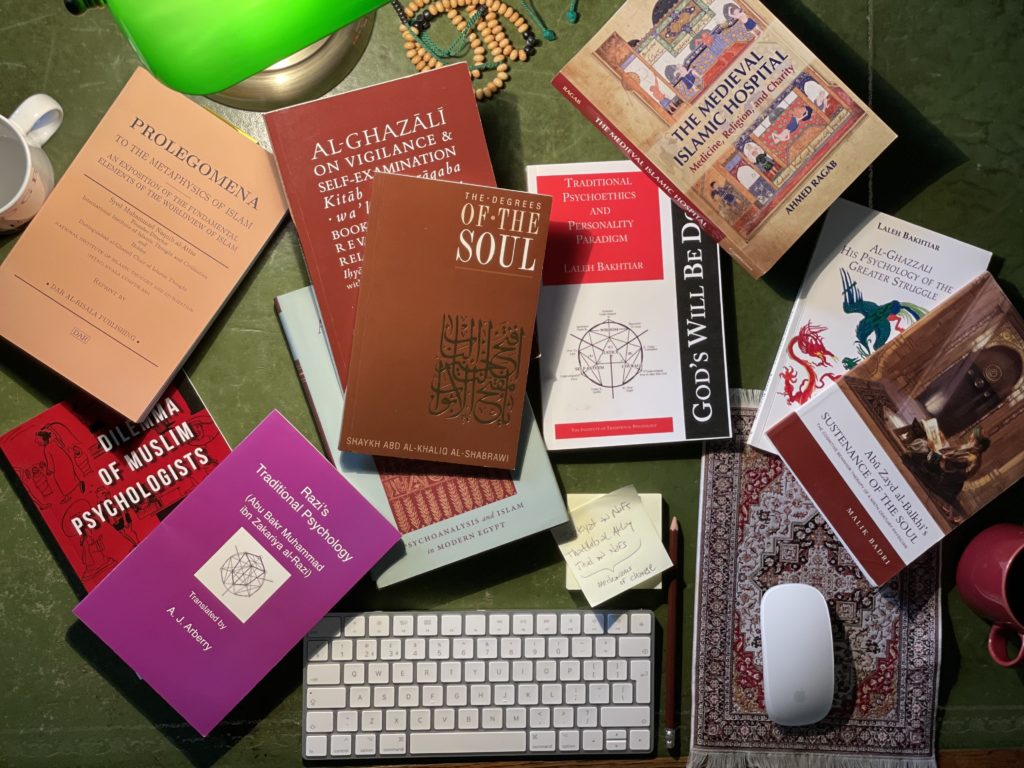
- The Diploma in Islamic Psychology is designed for individuals looking to deepen their understanding of classical Islamic psychology and engage with contemporary theory and practice.
- This programme is designed specifically for individuals who are either currently professionally qualified or licensed or are in the process of becoming qualified or licensed in fields related to psychology, including areas such as psychotherapy talking therapies, counselling, coaching, and more.
- This programme is for those wishing to gain grounding in an Islamic theoretical orientation to psychology and psychotherapy.
Practitioners of Islamic Psychology aid individuals in comprehending their life challenges through the lens of Islamic principles. They guide them in navigating these obstacles towards greater balance by fostering a stronger connection with God, with the Qur’an and Sunnah serving as their guiding sources. The therapeutic methods are drawn from traditional Islamic wisdom and healing practices, embodying a contemporary iteration of indigenous psychology
Students who wish to further their studies after the Diploma and pursue certification as a practitioner, will be eligible to do so via the Principles of Islamic Psychology in Practice programme, scheduled for Summer 2024 in Cambridge, UK. This Summer programme is only open to IP diploma graduates and current students.
Please Note: The Diploma is not a substitution for a formal qualification in psychology or Islamic Studies.
FURTHER INFORMATION
If you experience any issues uploading your supporting documents or personal statement, please email the documents directly to:
admissions@
This course is aimed at individuals who are training to become or are already licensed practitioners working in therapeutic and curative professions and are interested in adding a deeper spiritual element to their work.
Examples of such professionals can include (but is not limited to):
- Clinical psychologists
- Psychiatrists
- Licensed professional clinical counsellors
- Licensed marriage and family therapists
- Licensed mental health counsellors
Other entry requirements are:
- Evidence of professional training and license is required.
- A minimum of BA /BSC or equivalent qualification.
- Basic knowledge of Islamic Studies, as evidenced by familiarity with essential theological concepts and Arabic terminology also a requirement. This should be demonstrated through application documents (e.g., academic certificates, academic transcripts, reference letters, etc.).
- Proof of English language ability if English is not your first language.
- An Online Application Form, which requires uploading the following documents:
- Copies of academic certificates and transcripts
- Proof of English language ability if English is not your first language
- Two (2) reference letters sent directly from referees to admissions@cambridgemuslimcollege.ac.uk
*If you experience any issues uploading your supporting documents or personal statement, please email the documents directly to:
admissions@cambridgemuslimcollege.ac.uk
Application Guidance
All applicants should read the below documents carefully and send a copy of the Reference Guidance Notes to their referees.
Tuition fees for the Diploma in Islamic Psychology is £3,850. Successful candidates must confirm their place on the programme with a £450 non-refundable deposit. As per Terms & Conditions, there is a cooling off period of 14 days.
Once committed to the course, students can pay for their fees in one-lump sum, or over three equal instalments, paid termly.
Friday 4 Oct 2023 – Applications Open
Friday, 26 January 2024 – Applications Close
29 Jan-16 Feb 2024 – Shortlisting
w/c 19 Feb 2024 – Offers
Cambridge Muslim College reserves the right to amend the content and timing of the programme or discontinue the programme. Where possible, notice of any changes will be communicated.
Eligibility
-
- Can I apply if English isn’t my first language?
Yes. You are required to submit proof of English language skill. Please refer to the Application Guidance Notes. - Do I still need an IELTS if my degree was taught in English?
No. If your degree or higher education course was taught and assessed in English, then you do not need to take an IELTS or English language assessment. Please make sure to include proof that you have studied in English as part of your application. - Can I apply if I am still studying or haven’t finished my BA?
A BA degree is a requirement for the programme. If you will graduate before the start of the programme in September 2022 you are eligible to apply. You will be required to submit a copy of your certificate and final results before starting the programme if an offer is made. - Do I need an academic background in psychology or Islamic studies to apply?
No. You must have a minimum of a BA in any discipline with experience of working or training in a therapeutic field. Additionally, you must demonstrate a familiarity with basic Islamic terms and concepts. If you are a therapeutic practitioner (counsellor, psychotherapist, general practitioner, naturopath, etc.) you must provide evidence of relevant training. And if you are an Imam, scholar, or Chaplain, you must provide evidence of working in a pastoral care role. - Can I apply if I live outside of the UK?
Yes. The Diploma is taught online allowing students from all over the world to apply.
- Can I apply if English isn’t my first language?
Application Requirements
- My attached documents are in a different language, will they still count?
No. All submitted documents must be in English. Translated documents must be provided by either an official at an embassy, consulate or a recognised translator. The translation must be stamped and include the translator’s details. - I have been out of education for a long time, would you accept two professional references?
At least one of your references should be academic. However, if you are unable to provide one, use your personal statement to communicate your academic capacity to undertake the programme. - Can I apply if I am working full-time?
Yes. Please refer to the programme outline and term schedule to ensure you are able to organise your work schedule around the live classes each week (1-3pm UK time) and can allocate at least nine hours each week to undertake the coursework.
Programme
- Will this programme run next year?
Yes. We plan to run this programme again each year, inshaAllah. - Can I defer a year?
Yes. You can request to attend the programme next year if you are offered a place and cannot attend during the 2024-25 academic year. - Is the Diploma accredited? Will it allow me to become a therapist?
No. The Diploma is not accredited by any validating body nor is it an accredited course. This Diploma is designed to provide practising professionals with specialised training in Islamic psychology theoretical and practical foundations. - Are the live lectures (1 pm UK Time) available as recordings afterwards?
Students must attend live sessions and are not permitted to miss more than three per module. However, live sessions are recorded for review and those who could not attend due to extenuating circumstances..
Assessment
- How will the Diploma be assessed?
Students will be assessed using different methods aligned with module objectives. This may include, but not limited to class discussions, essays, critical dialogue, presentations, group projects, journaling progress or written examinations. Students are not permitted to miss more than three live sessions per module. In lieu of missed classes, students must watch recordings of the missed lecture. - What happens if I fail?
Students who do not pass all required assessments will not receive a Diploma.
Applications are closed
Any questions? Email us at admissions@cambridgemuslimcollege.ac.uk
